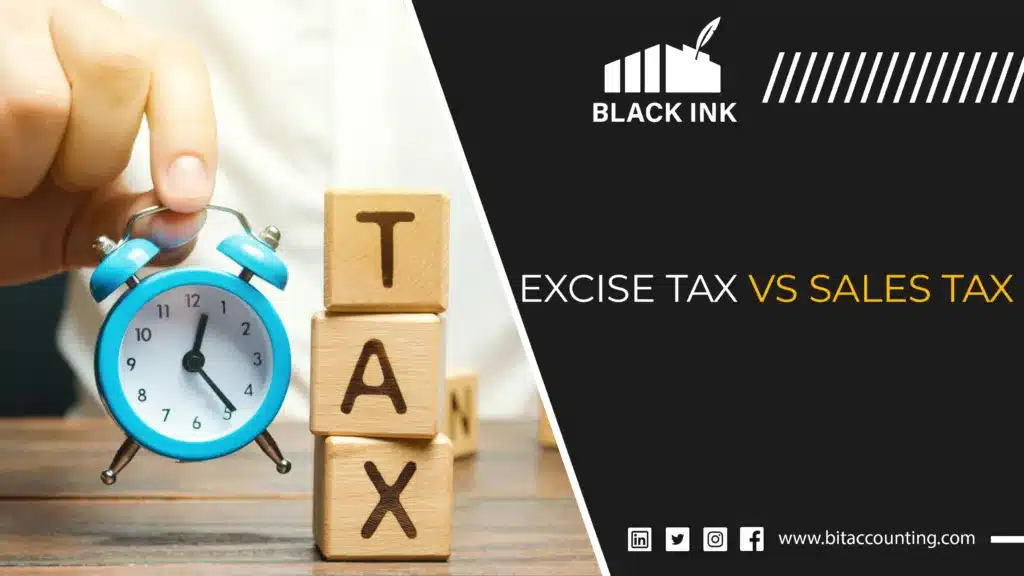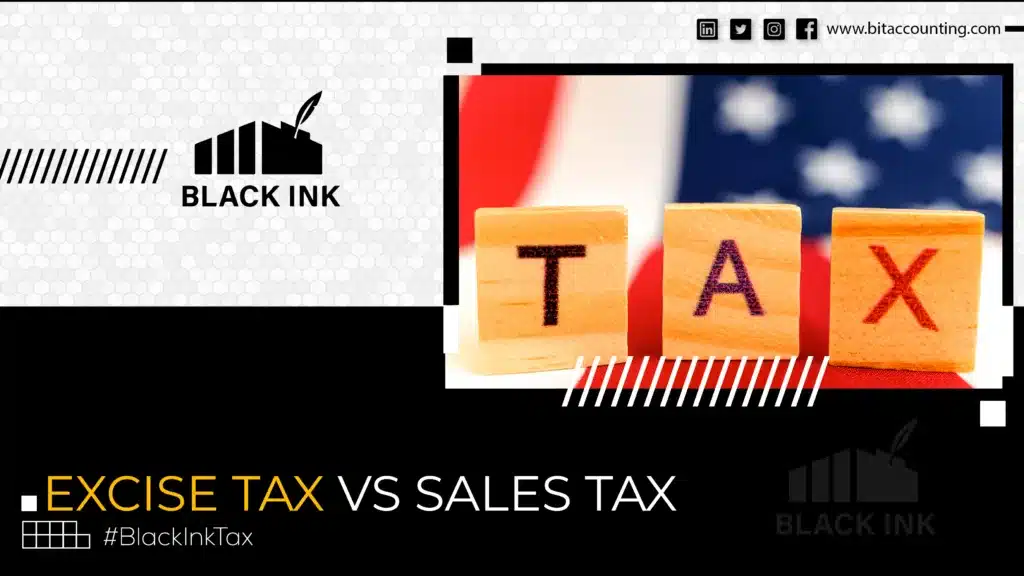
Table of Contents
Indirect Tax 101: Difference Between Excise Tax vs Sales Tax
Taxes can be confusing, but they are a major part of how governments keep the world running. One important category of taxes is indirect taxes—the ones we pay without even realizing it most of the time. Two of the most common types are excise tax and sales tax.
Both affect the price of the goods and services we buy, but they work in very different ways. Understanding the difference between excise tax vs sales tax can help businesses stay compliant and help consumers know where their money goes.
In this blog, we’ll break down what indirect taxes are, explain how sales tax and excise tax work, explore their pros and cons, compare them side-by-side, and share how businesses handle them—plus how experts like BIT Accounting can help.
What is Indirect Tax?
An indirect tax is a tax collected by a business or intermediary on behalf of the government. Instead of paying the government directly, you pay it through a purchase, and the business passes it on.
This is different from a direct tax (like income tax), which you pay straight to the government yourself.
Common examples of indirect taxes include:
- Value-Added Tax (VAT)
- Goods and Services Tax (GST)
- Sales tax
- Excise tax
- Tariffs and customs duties
Why do governments use indirect taxes?
- To raise money for public services
- To influence consumer behavior (e.g., taxes on cigarettes to discourage smoking)
- To target certain industries for funding infrastructure or health programs
Understanding Sales Tax
Sales tax is a percentage added to the price of a product or service at the time of sale.
When you buy something in a store or online, you might see a separate line on the receipt showing the sales tax amount. This makes sales tax highly visible to the customer.
Who pays and who collects?
- Payer: The consumer
- Collector: The business, which sends the money to the government
Types of Sales Tax
- Retail Sales Tax – Added at the final sale to the end consumer.
- Gross Receipts Tax – Charged on a business’s total revenue, whether or not a profit is made.
- Value-Added Tax (VAT) – Charged at each stage of the supply chain on the value added to the product.
How Sales Tax Works
- Collection Point: Usually collected at the state or local level (in the U.S.).
- Taxable vs. Exempt Goods: Some items like groceries or prescription medicines are often exempt.
- Example Rates:
- California: 7.25%
- Texas: 6.25%
- UK VAT: 20%
Advantages and Disadvantages of Sales Tax
Here are the pros and cons of sales taxes
Advantages of Sales Tax
- Simple to Administer: Easy for governments to collect from businesses.
- Broad Revenue Base: Applies to many products and services, creating steady income for public budgets.
Disadvantages of Sales Tax
- Regressive Impact: Affects low-income households more, since everyone pays the same rate regardless of income.
- Compliance Burden: Businesses must track rates, exemptions, and file reports—especially challenging for online sellers across states.

Understanding Excise Tax
Excise tax is a tax applied to specific goods or activities, often charged per unit rather than as a percentage of price. It’s usually included in the product’s price, so customers may not notice it directly.
Key difference from sales tax:
- Sales tax is charged on the total sale price at checkout.
- Excise tax is often built into the price and applied earlier in the supply chain (production or import).
Who pays and who collects?
- Payer: Manufacturers or importers (cost is usually passed to consumers)
- Collector: The business that produces or sells the product
Types of Excise Tax
- Specific Excise Tax – Fixed amount per unit (e.g., $1 per pack of cigarettes).
- Ad Valorem Excise Tax – Percentage of the product’s value (e.g., 10% on luxury cars).
- Sin Taxes – On products like alcohol, tobacco, or gambling to reduce harmful use.
- Environmental Taxes – On gasoline or carbon emissions to promote greener choices.
How Excise Tax Works
- Collection Stage: Applied at manufacturing or import.
- Transparency: Less obvious to consumers because it’s already in the product price.
- Examples:
- Federal gas tax in the U.S.: $0.184 per gallon
- Airline ticket taxes for airport security and infrastructure
Advantages and Disadvantages of Excise Tax
The following are the key pros and cons of excise tax:
Advantages of Excise Tax
- Discourages Harmful Consumption: Higher prices on unhealthy or polluting goods encourage better choices.
- Targeted Revenue: Funds can be directed to related causes (e.g., tobacco taxes funding healthcare programs).
Disadvantages of Excise Tax
- Can Lead to Black Markets: High taxes on certain goods can encourage illegal trade.
- Industry Impact: Certain sectors bear a heavier burden, which can hurt jobs and competitiveness.
Key Differences Between Excise Tax vs Sales Tax
Feature | Sales Tax | Excise Tax |
What’s taxed | Most goods & services | Specific goods or activities |
Calculation method | Percentage of sale price | Per unit or % of product value |
When applied | At point of sale to consumer | At production or import stage |
Visibility | Shown separately at checkout | Usually included in product price |
Purpose | General revenue | Targeted revenue / behavior influence |
Examples | Clothing, electronics | Gasoline, cigarettes, luxury cars |
Excise Tax vs Sales Tax: Real-World Examples
The examples of sales tax is buying a $1,000 TV in California adds $72.50 in sales tax at checkout.
However, the example of excise tax is filling your car’s gas tank already includes the per-gallon federal gas tax in the pump price.
How Businesses Handle Excise Tax vs Sales Tax
For businesses, managing these taxes is more than just tacking a few dollars onto a price tag.
Sales Tax Compliance:
- Register with the correct state or local agencies
- Track tax rates and exemptions
- File returns on time and remit collected taxes
Excise Tax Compliance:
- Follow federal or industry-specific rules
- Pay excise taxes directly to the IRS or other authorities
- Keep detailed production/import records
Tools That Help:
- Avalara, QuickBooks Tax, and other automated systems
- Accounting firms that specialize in multi-state and federal tax compliance
Penalties for Non-Compliance:
- Heavy fines
- Audits that can disrupt business operations
How Tax Experts at BIT Accounting Help You
At BIT Accounting, we make navigating the complexities of excise tax vs sales tax simple. Our experts:
- Keep you compliant with both state and federal rules
- Set up systems to calculate and collect the right amount of tax
- Help you avoid penalties and stay audit-ready
- Provide tailored advice for your industry
Whether you’re a small shop or a large manufacturer, we ensure your tax processes run smoothly, so you can focus on growing your business.
Conclusion
Understanding excise tax vs sales tax isn’t just a matter of curiosity—it’s a practical necessity for both consumers and businesses. Sales tax is the familiar percentage you see at checkout, while excise tax often hides within the product price but can influence what you buy and how much you pay.
With the right knowledge—and the right partner like BIT Accounting—you can handle these taxes confidently, avoid costly mistakes, and make smarter financial decisions.
FAQs
1: What is the main difference between sales tax and excise tax?
Sales tax is applied as a percentage of the sale price, while excise tax is often a fixed amount per unit or a percentage on specific goods.
2: Who pays excise tax?
Technically, manufacturers or importers pay excise tax, but the cost is usually included in the price consumers pay.
3: Why does the government use excise taxes?
To generate targeted revenue and influence consumer behavior, often discouraging harmful or polluting activities.
4: Are groceries taxed?
In many U.S. states, groceries are exempt from sales tax, but this varies by location.
5: What are examples of excise tax?
Gasoline tax, tobacco tax, alcohol tax, luxury car tax, and airline ticket fees.
6: Can businesses claim back sales tax or excise tax?
In some cases, businesses may claim sales tax exemptions or credits, but excise taxes are generally non-refundable.
7: How can BIT Accounting help with tax compliance?
We manage the setup, collection, reporting, and payment processes for both sales and excise taxes, ensuring compliance and efficiency.
GET FREE QUOTE FOR ALL OF OUR SERVICES
Black Ink will send you a free analysis of your current state and what would be the cost of managing either a separate accounting and bookkeeping services or a complete solution across New York, USA. Do get in touch and we will be happy to consult you with our bookkeeping services in NY, New York, USA.
